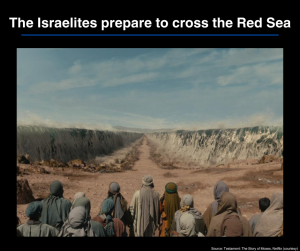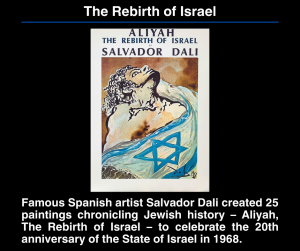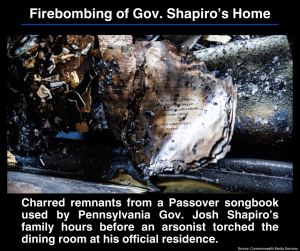
![]()
BACKGROUND – TALKING POINTS – ACTIONS – STORIES
![]()

From the back-breaking whips of ancient Egyptian overlords to modern-day vandalism, violence and murder, the Jewish people have long been targets of scapegoating and hatred. Today’s blood libels, hateful rhetoric and distorted portrayals of Jews trace back centuries. This long history reflects a recurring pattern where Jewish communities have faced hostility in different eras and regions.
For more than 3,000 years, Jews have gathered for the annual Passover seder, where they read: “In each and every generation they rise up against us to destroy us. And the Holy One, blessed be He, rescues us from their hands.” This passage highlights the deep historical consciousness of persecution and resilience of the Jewish people – from the Crusades to the pogroms and from the Holocaust to the October 7 massacre by Hamas. Today, Jewish hostages in Gaza remain in captivity as many of their ancestors were before them.
The Hebrew word for Egypt, Mitzrayim, means “narrow place,” symbolizing the confinement of Jewish life during slavery. The Passover story, told in a book called the Haggadah, recounts the Israelite traditional story of miraculous deliverance from Egyptian oppression, marked by 10 plagues and the parting of the Red Sea, as described in the Book of Exodus. It is a seminal event in Jewish history – marking the birth of the Jewish nation and its enduring hope for freedom.
This age-old hatred has taken many forms over the centuries. From Pharaoh to Iran’s Ayatollah, and from campus violence to venomous social media influencers, the target remains the same – the Jewish people, in Israel or anywhere around the world.
Hatred of Jews Rooted in Conspiracy: Ancient Narratives and Modern Tropes
In ancient Egypt, according to the Book of Exodus, Pharaoh forced the Hebrews into grueling labor to build Egypt’s cities, illustrating how oppression can be fueled by fear and conspiracies, with Pharaoh portraying the Hebrews as a threat to the Egyptian nation. Despite having long lived peacefully in Egypt, Pharaoh incited Egyptians to believe that the Hebrews would unite with Egypt’s enemies to overthrow their government.
The Biblical account describes Pharaoh’s extreme cruelty – including ordering the deaths of newborn Jewish boys and subjecting the Jewish people to unbearable physical and psychological torture. This ancient story of persecution based on perceived difference and disloyalty resonates with later forms of antisemitism – hatred of the Jewish people.

The Lie of Jewish Control: The Protocols of the Elders of Zion
First published in Russia in 1903, a notorious hoax, the Protocols of the Elders of Zion, spread false conspiracy theories about global Jewish power and domination. Translated into multiple languages, the document claimed to represent minutes from secret meetings of Jewish leaders plotting to control world politics, media, and other institutions. The Elders of Zion do not exist, nor did these secret meetings ever take place. Despite being proven false, the Protocols fueled hatred and led to pogroms, especially in Ukraine, where tens of thousands of Jews were murdered.
The Protocols were used by Hitler to justify violence and spread hatred of Jews, and its themes influenced antisemitic campaigns under Stalin. American business leader Henry Ford believed the lies and published a 91-part series based on the Protocols in his newspaper starting in 1920. Though the document has been debunked countless times, it continues to sell today and remains a potent tool for antisemites – perpetuating dangerous narratives about Jews seeking to dominate the world.
Nazi Dehumanization and the Holocaust
The Nazis were propaganda experts who used devious advertising and that day’s technology – radio and movies – to disperse their anti-Jewish narratives and warped Jewish stereotypes – manipulating public opinion, influencing behavior and spreading hate. This propaganda created an environment of intolerance and hate which ultimately facilitated the Holocaust, leading to the murder of 6 million Jews.
Violence in the Arab World and the Rebirth of Israel
Hatred of Jews persisted even after the Holocaust. In 1945, on the anniversary of the British Balfour Declaration that advocated for a national home for the Jewish people in Israel, an anti-Jewish student protest in Cairo sparked riots that spread across Egypt. Thousands of Egyptians drove through the streets chanting “Death to the Jews.” The violence escalated into pogroms: Jewish stores were looted, homes and synagogues set on fire and Torah scrolls and sacred books burned.
In Nov. 1947, the UN voted to approve the creation of independent Arab and Jewish states in the region of historical Palestine. Following Israel’s declaration of independence in 1948, five Arab nations invaded the newly declared sovereign nation. During the war, thousands of Egyptian Jews were arrested and placed in camps, many wounded or killed. Synagogues, Jewish-owned businesses and homes were bombed. Faced with oppression and inspired by Zionism, the vast majority of Egypt’s Jewish community – 75,000 in 1948 – fled or were expelled from Egypt over the following decades. This started with 35,000 Jews after Israel’s creation – a second Exodus.

Persistent Hatred: From Ancient Roots to Modern Times
Following the re-establishment of a Jewish nation – the first since the Kingdom of Israel – the rejection of its existence became a rallying cry for many. Groups like the Palestinian Liberation Organization were founded – in 1964, before Israel was in the West Bank and Gaza – to use terrorism backed by propaganda to destroy Israel. The rise of Hamas murdering 20 Jews at the 2002 Passover Seder massacre, the launching of thousands of rockets into Israel and the Oct. 7 atrocities proved its violent rejection of the Jewish state.
The hatred of Jews found a powerful state sponsor – the Islamic Republic of Iran. The Iranian regime promotes anti-Israel propaganda, supports student protests on American university campuses and sponsors proxy groups like Hamas in Gaza, Hezbollah in Lebanon and the Houthis in Yemen – all openly calling for Israel’s elimination. This state-sponsored terrorism fuels regional instability and contributes to the ongoing threats against Israel.
The relentless hatred of Jews has also morphed into ideological opposition to Zionism – the Jewish people’s right to self-determination in their ancestral homeland, Israel. This is often seen in slogans like, “From the River to the Sea,” which means for the dismantling of Israel. Denying Israel’s right to exist as the nation-state of the Jewish people is a core tenet of contemporary anti-Jewish ideology. This is recognized by the International Holocaust Remembrance Alliance’s working definition of antisemitism that was adopted by the U.S. government and many others.
Tragically, this hateful ideology can also be found influencing narratives on university campuses and even in K-12 schools – contributing to a hostile environment for Jews and those who support Israel. Also, Palestinian children– mostly in UN-run schools – are taught from a young age to hate Christians, Jews and Israel – and call for its destruction.
Theodor Herzl, one of modern Zionism’s founders, wrote in The Jewish State: “Oppression and persecution cannot exterminate us. No nation has endured what we have. The strong among us defiantly return to our own. We shall at last live as free people on our own soil – and peacefully die in our own homes.”
![]()

![]()

Share the spirit of Passover so we never forget: Share the inspiring spirit of Passover, highlighting how the Exodus story of liberation has resonated with both Jews and non-Jews in the fight for freedom. Learn about the profound significance of the story of the Exodus to Jewish history and the Jewish people’s ancient bond with Jerusalem. Take this time to educate others about the richness of Jewish history, faith and culture, promoting understanding and pride.
![]()

Jewish Governor’s Home Firebombed Hours After Family Seder
A 38-year-old man torched part of the Pennsylvania governor’s mansion while Gov. Josh Shapiro and his family were asleep. The arsonist scaled the fence surrounding the governor’s home and started a fire that significantly damaged the room the Shapiro family used hours earlier for their Passover Seder. The governor is married with four children. The suspect used beer bottles containing gasoline and planned on using a sledgehammer to attack the governor.
Gov. Shapiro: “If he was trying to terrorize our family, our friends, the Jewish community who joined us for a Passover Seder in that room last night, hear me on this: We celebrated our faith last night, proudly, and in a few hours we will celebrate our second Seder of Passover.”

![]()
In light of the surge of current relevant news, please subscribe to our Daily News Brief, a digest of critical news headlines curated from thousands of media addressing issues that affect the Jewish world.
![]()

This content is developed by The Focus Project in partnership with MERCAZ USA. The Focus Project distributes weekly news and talking points on timely issues concerning Israel and the Jewish people, including antisemitism, anti-Zionism and the delegitimization of Israel. It represents a consensus view across a spectrum of major American Jewish organizations. MERCAZ USA recognizes and respects the diversity of views on these issues among its readers and the community at large.
![]()